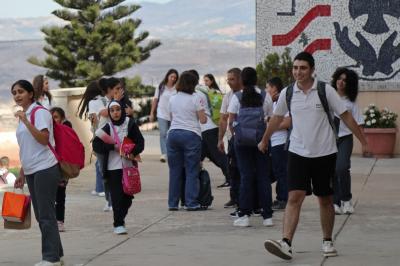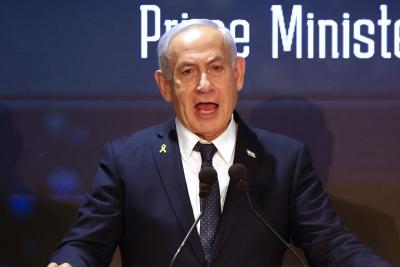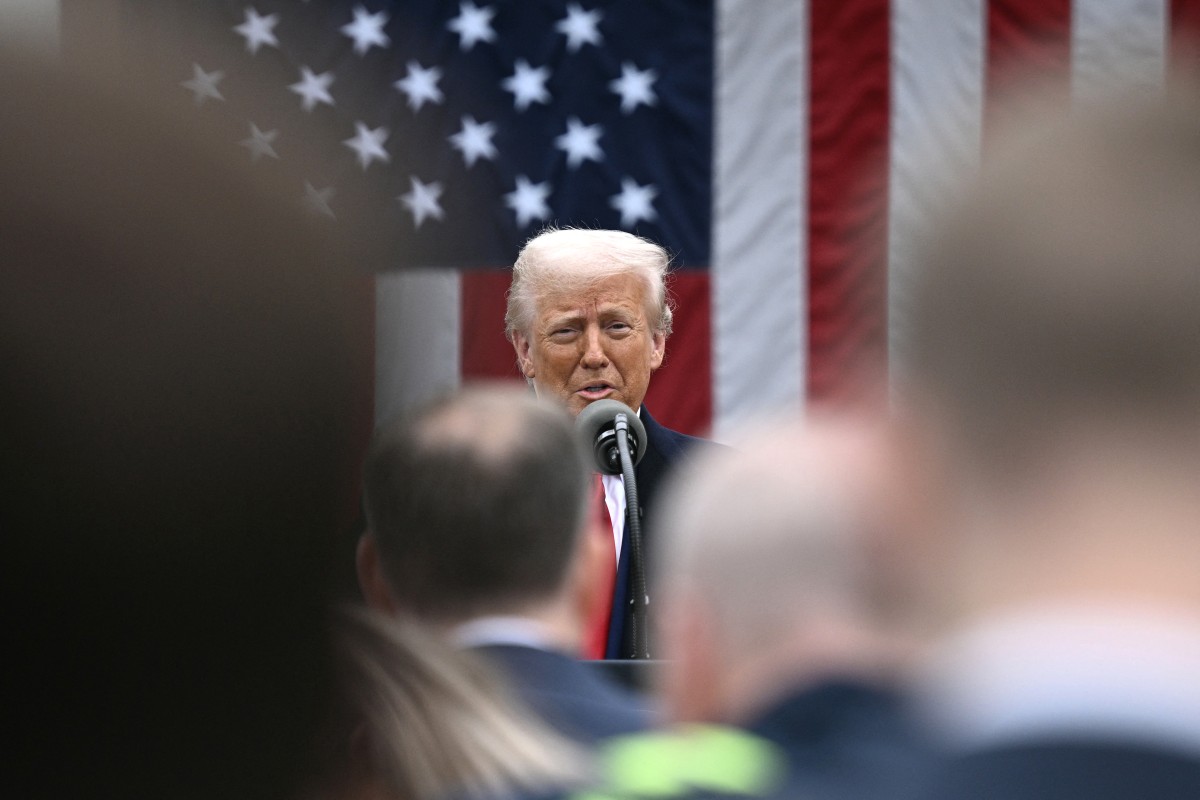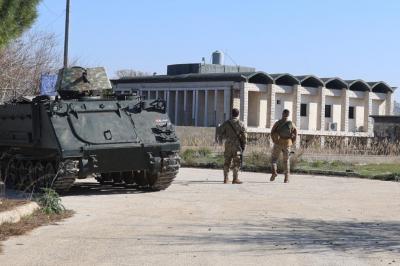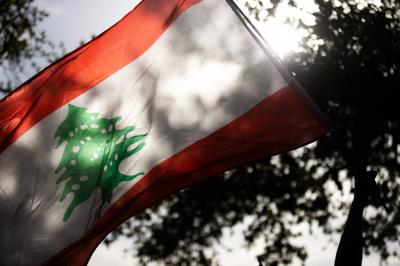Revolutions are not driven by poverty alone but by the awareness of injustice among the poor. A ruler’s objective is not merely to keep people struggling but to ensure they remain unaware of the true causes of their suffering. As Noam Chomsky states, “If you keep people busy just trying to survive, they won’t have time to think about change or freedom.”
The most effective form of control is not brute force but keeping a population hungry and desperate, ensuring their sole focus remains survival. Tyrants do not fear poverty; they fear the moment people realize who is responsible for their suffering. By framing hunger as fate, obedience as virtue, and hardship as unavoidable, they suppress any resistance. As George Orwell warned, “The most effective way to destroy people is to deny and obliterate their own understanding of their rights.”
With this in mind, one might question how Donald Trump’s leadership would unfold in Lebanon—a nation grappling with corruption, economic collapse, and political turmoil. His U.S. presidency was marked by populist rhetoric and an “America First” doctrine. Could a similar “Lebanon First” approach under Trump restore stability and revive Lebanon’s historic reputation as the “Switzerland of the East”?
Challenging Political Establishment: Reform or Division?
Trump excels at portraying himself as an outsider taking on corruption and exposing the inaction of so-called "sleeping Joe(s)" who have failed to act since Lebanon’s financial collapse in 2019. In a country where sectarian power-sharing has allowed a self-serving elite to flourish, his "drain the swamp" rhetoric could resonate strongly. He would likely push for mandatory third-party audits of political parties and NGO financing, making the findings public to hold key players accountable. By leveraging the higher courts to prosecute corruption, he could spark a political earthquake, potentially leading to the indictment of numerous top politicians and party leaders.
However, Lebanon’s deeply entrenched sectarian system would put Trump’s leadership style to the ultimate test. By championing the private sector and liberal factions while positioning Carlos Ghosn as Lebanon’s equivalent of Elon Musk, he could spark a surge of economic ambition. His approach might involve appointing experienced retirees from the military, general security, judiciary, and academia to major control roles. Implementing Key Performance Indicators (KPIs) for all public operations, rulings, and permits—along with strict milestones and minimal tolerance for delays—could bring much-needed efficiency. While his aggressive push for reform could expose widespread corruption and inefficiency, it also risks triggering fierce resistance from deeply entrenched power brokers.
Foreign Policy: Strengthening Alliances or Deepening Conflicts?
Lebanon’s political landscape is heavily influenced by regional powers such as Iran, Saudi Arabia, and the U.S. Trump’s strong pro-Israel stance could pressure Lebanon to distance itself from neighboring countries, many of which face the risk of sectarian divisions and internal fragmentation, while Israel remains the only state actively pursuing territorial expansion. This shift could escalate tensions with Hezbollah, Lebanon’s dominant political and military force backed by Iran.
Trump might adopt a hardline approach, advocating for Hezbollah’s disarmament while reinforcing Lebanon’s national armed forces. Such a strategy could pave the way for a federalist system, where different sectarian groups govern their own communities while remaining under the broader framework of the Lebanese state.
However, Trump’s deal-making style could lead him to pursue an agreement between Lebanon and Israel, inspired by the Abraham Accords. While this initiative would likely face significant opposition from Hezbollah and its allies, their resistance could be weakened by Israel’s recent military actions against Hezbollah and the diminishing influence of Hezbollah’s military power in Lebanon’s political sphere. Trump might propose major incentives to Hezbollah, he could secure the rebuilding of war-torn areas in the South and Bekaa, fostering the recovery of local economies. Additionally, Trump could persuade the Shiite community to participate in Lebanon’s political system exclusively as a political party, rather than through military factions, promoting a more stable and unified approach to governance, he might also shift the financial responsibility to Arab states, rather than Iran, to resolve the issue—similar to how the U.S. has pressured the EU regarding the Ukrainian conflict.
Economic Policy: Investment or Instability?
Lebanon is facing an unprecedented economic crisis, marked by a collapsed currency, frozen bank deposits, and a massive $120 billion debt—$30 billion owed by the central government and $90 billion by the Central Bank. The country’s GDP has shrunk by 38%, while the Lebanese Pound, once pegged to the dollar in 1997, has lost over 98% of its value in the market.
Trump, known for challenging elites, would likely target "corrupt bankers" and push for bold financial reforms. His pro-business approach might lead him to advocate for dollarization. He may argue that the Central Bank, rather than the state, owns Lebanon’s gold reserves, as President Sarkis purchased the gold using Central Bank funds. Although parliament issued a decree prohibiting its liquidation, ownership was never formally transferred. Additionally, he would likely take a serious approach to recognizing public state assets and could negotiate using them as collateral to secure funding.
However, considering his track record of focusing on short-term gains, Trump may introduce property taxes on vacant lands and apartments to restore confidence in Lebanon’s real estate sector and incentivize the development of vacant plots, particularly endowment lands, as well as rental activities to help in reducing the housing finance shortage.
While his policies could attract foreign investment and spur infrastructure projects, they might also include the privatization of public services and infrastructure. He will compare the funds spent on electricity production since 1992 with the cost of implementing a free solar energy supply system and atmospheric water generators (AWG) for every home, industrial building, and public facility in the country. Trump would undoubtedly seek to negotiate a more favorable deal with TotalEnergies, along with other major players in the oil and gas sector, while also exploring opportunities for land-based exploration. Additionally, he would investigate the potential for extracting other raw materials and minerals.
Would he engage with the International Monetary Fund (IMF) for a bailout, or reject external oversight as he has with other global institutions? Alternatively, he may focus on strengthening relationships with Gulf countries like Saudi Arabia and the UAE, securing their financial backing to stabilize Lebanon’s economy. Trump’s unpredictable foreign policy approach could provide Lebanon with strategic economic advantages while helping it avoid becoming entangled in broader Middle Eastern power struggles.
Security and Military Strategy: Strengthening Institutions or Provoking Unrest?
Trump’s “law and order” philosophy implies he would likely aim to strengthen the Lebanese Armed Forces (LAF) to diminish the influence of local armed groups. While this could enhance state security, it also carries the risk of triggering internal unrest, particularly due to Hezbollah’s entrenched political and military presence. However, direct confrontations between the LAF and Hezbollah are unlikely, as Trump’s skill in negotiation and dialogue could help manage tensions.
Trump’s firm stance on immigration could extend to Lebanon’s three million Syrian and Palestinian refugees, advocating for their repatriation despite the ongoing instability in Syria. While this policy might appeal to Lebanese citizens frustrated by the economic burden of hosting refugees, those in good standing would likely face no threat of deportation. Trump would likely leverage diplomatic pressure on the international community, using every persuasive tool at his disposal to achieve his objectives.
Trump would back Judge Tarek Bitar in his investigation, viewing a fair ruling on the Beirut port explosion as crucial for restoring trust in the judicial system and attracting investors. He would likely assign a military unit to ensure that all individuals convicted in connection with the incident are brought to justice until the investigation is concluded.
Governance and Social Policy: Reform or Polarization?
Trump’s history of conflicts with the media and opposition groups indicates he would likely face resistance from Lebanon’s press, which has long been a tool for promoting the interests of the corrupt elites. He will support some and decline others just like Fox news and CNN in the US. His reaction to protests, such as those seen during Lebanon’s 2019 uprising, could mirror his response to student protests in U.S. universities during the Gaza war, possibly resulting in crackdowns on dissent and civil liberties.
The Trump Factor: Disruption or Transformation?
Would Trump’s leadership provide the much-needed disruption Lebanon requires or create even greater chaos? His outsider status and willingness to challenge political elites could expose corruption and inefficiency, resonating with a population eager for change. However, his unpredictable style, disregard for political norms, and confrontational tactics may further destabilize Lebanon’s already fragile system.
While his economic policies could attract foreign investment, they might not address the deeper causes of Lebanon’s financial collapse. His nationalist rhetoric could fuel reform, but his polarizing approach to governance could deepen societal divisions. Some might see him as a bold disruptor capable of breaking Lebanon’s political deadlock, while others could view him as a destabilizing force in a country that needs careful diplomacy and unity.
Trump’s Lebanon: A Vision for Renewal
A Trump presidency in Lebanon would undoubtedly bring both challenges and opportunities, marked by economic risks, diplomatic unpredictability, and governance clashes. However, it could also introduce a bold, macro-level strategy to position Lebanon as a regional hub for economic growth and innovation, leveraging its potential to drive progress across the Middle East. His leadership, often characterized by controversy and disruption, might ignite much-needed reform, fostering stability and positioning Lebanon as a bridge between East and West through policies that promote openness, education, and a dynamic social environment. Yet, Lebanon’s deep-rooted issues require long-term structural solutions and national unity rather than short-term populist measures.
One thing is certain—Lebanon under Trump would never be boring.
 French
French


